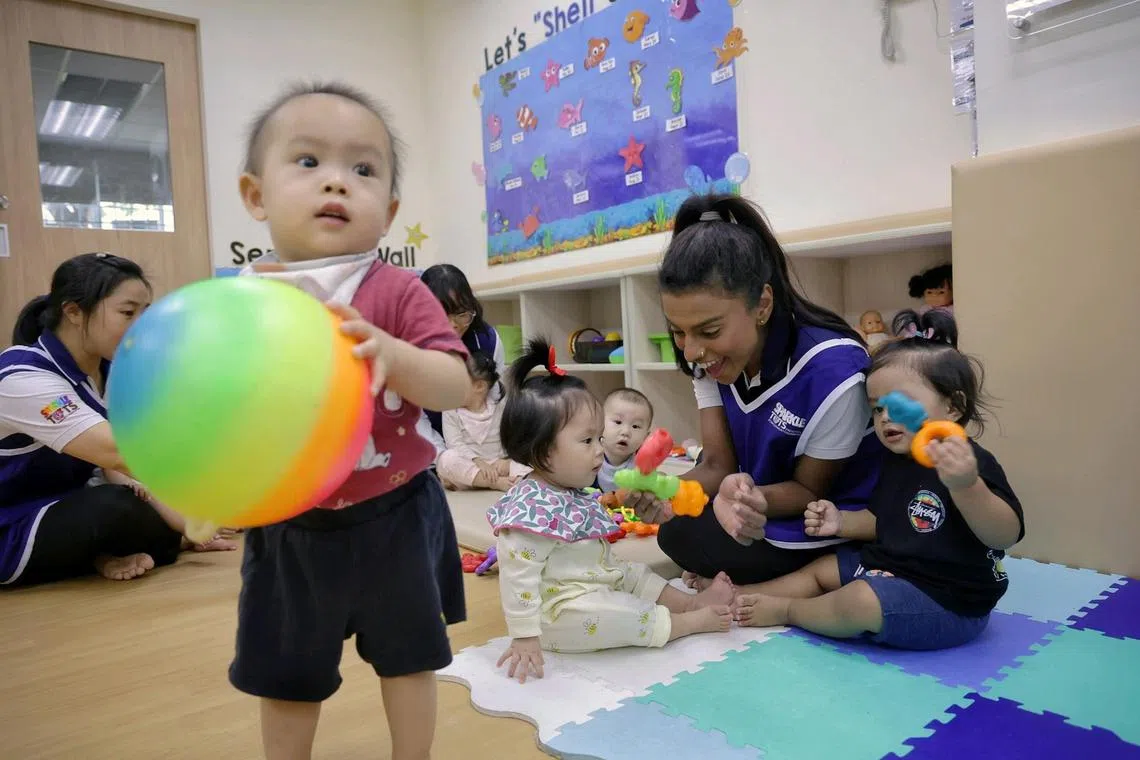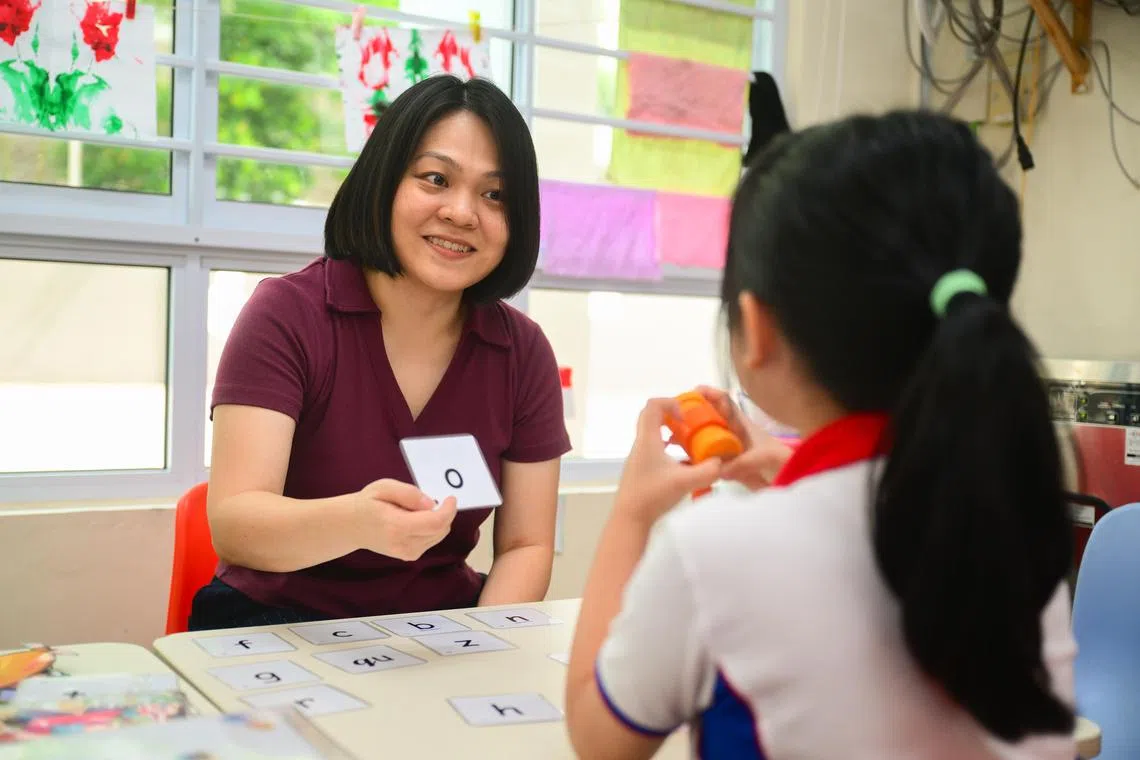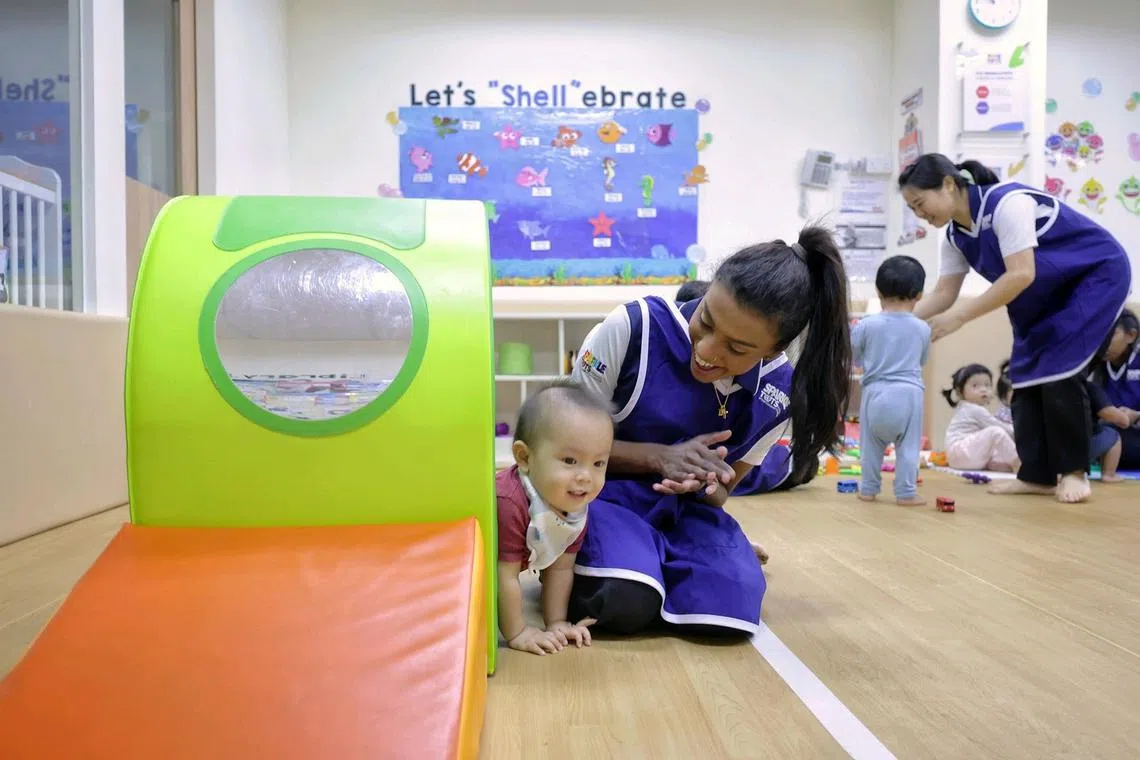More pre-school teachers going for training to hone their craft in early childhood
Sign up now: Get ST's newsletters delivered to your inbox

Infant educator Christine St Knight (right), 30, engaging infants in playtime at PCF Sparkletots @ 337 Canberra on Sept 4, 2024.
ST PHOTO: KEVIN LIM
Follow topic:
SINGAPORE - More pre-school teachers are going for training to be better equipped to support young children with special needs or learn classroom management, among emerging areas of need in the sector.
Since its inception five years ago to provide training to Singapore’s early childhood educators, the National Institute of Early Childhood Development (NIEC) said the number of pre-school teachers attending courses to upskill while working has more than doubled.
From 2,400 students in 2019, the number of those enrolled in these in-service courses meant for existing educators in the sector has surged to 6,200 in 2023.
Courses cover areas such as leadership, outdoor learning and special needs, and are mostly conducted at the NIEC City Campus in Bras Basah, as well as Ngee Ann Polytechnic and Temasek Polytechnic.
Some can take place online or involve blended learning where students attend a mix of online and in-person classes.
NIEC accepted 2,500 students each year into its full-time diploma qualification courses in the past three years, two-thirds of whom are new to the early childhood sector.
In particular, the institute has seen rising interest in teaching children in their early years, from infancy to the age of three.
Its advanced certificate in early years course, which is available in English and Chinese, had on average a combined yearly intake of 680 students for the last three years.
In the first half of 2024, the intake of students grew by 20 per cent, compared with the same period in 2023.
These training opportunities are part of the Early Childhood Development Agency’s efforts in recent years to attract and retain talent in the sector, as it ramps up recruitment of teachers to meet growing demand for pre-school places.
These include raising salaries and guiding educators in charting out their career progression through specifying the skills and abilities needed across different roles and stages.
Ms Annie Lim, 36, a learning support educator with pre-school operator PAP Community Foundation (PCF), took up NIEC’s specialist diploma in early childhood learning support in September 2023.
She attends classes three times a week in the evening after a full day of school to learn specialised skills to support children with mild developmental needs. She will complete the course in October.
Ms Lim switched to the early childhood sector in 2023, after finding her interest in helping children with developmental needs as a special education officer for almost eight years at the Ministry of Education.

Ms Annie Lim, 36, a learning support educator with pre-school operator PAP Community Foundation (PCF), took up NIEC’s specialist diploma in early childhood learning support in September 2023.
ST PHOTO: AZMI ATHNI
An encounter with a Primary 3 pupil who struggled to read showed her the importance of building a strong foundation for children before they start primary school.
“Having early intervention is important. You can see the difference between a child who has attended pre-school and one who has not, and also a child with support at the pre-school level and one without,” said Ms Lim.
“When it comes to supporting children, it’s good to have many tools on hand because every child is different... So it’s important to equip ourselves with the latest skills and strategies,” she added.
Another educator who juggled work and studies, Ms Christine St Knight, 30, took a long route after graduating from Nanyang Polytechnic in 2019 to fulfil her dream of joining the pre-school sector.
As she was in the Normal (Technical) stream in secondary school, she did not qualify for early childhood courses in the Institute of Technical Education or polytechnic, so her backup choice was a diploma in visual communication.
Undeterred, she kept applying to pre-schools before finally being given the chance to be an assistant teacher at a PCF Sparkletots pre-school in Jurong.
While there, she enrolled in NIEC’s advanced certificate in early years course so she could be a full-fledged early years educator.

In January 2024, Christine St Knight transferred to the PCF Sparkletots pre-school at 337 Canberra, and hopes to go for more training.
ST PHOTO: KEVIN LIM
During the eight months of the course from February to October 2023, Ms Knight would be at the pre-school centre from 7am to 1pm, and go for classes at the NIEC City Campus in Bras Basah from 2pm to 6pm.
“During the course, I learnt how to observe the children, provide activities that will cater to their age group, and also use the right techniques during routine care.
“It was eye-opening for me, and it confirmed that this is what I want to do,” she said.
In January, Ms Knight transferred to the PCF Sparkletots Pre-school @ Canberra Block 337, and hopes to go for more training.
“I don’t want to stop here. I have bigger dreams, and hope to hold senior positions and have leadership responsibilities in five to 10 years’ time,” she said.
Supporting aspirations
Ms Jasawant Kaur, 54, senior centre principal of the pre-school, said that interactions between centre leaders and educators are key in understanding teachers’ current roles and aspirations.
Ms Kaur said: “When we speak to them, we can help them to map out their career path or ask them where they’d like to see themselves in the next three years.
“That’s how we gauge how motivated the teacher is, and identify which areas the teacher may require assistance in.”
Another centre principal from ACE @ Work Childcare, Ms Kurtrina Foo, 28, said it is important to create a supportive culture among educators for smaller pre-school operators, so the staff can cover for each other when they go for professional development courses.
Although a relief staff pool to help all pre-schools meet their manpower needs is in the works, Ms Foo is apprehensive about being totally dependent on this support.
“Unfortunately, as a smaller operator with only five centres, our staff bandwidth is a lot more limited compared with larger operators.
“We have to ensure that the number of people who are away is controlled, so that the workload for the others is manageable.”
She added that centres have to plan ahead to accommodate teachers’ schedules and conduct in-house training workshops or programmes that can benefit all educators at the centre, instead of relying only on external training.
“(This way), everything happens within the scheduled working hours, so our teachers won’t feel overworked or stressed.”


